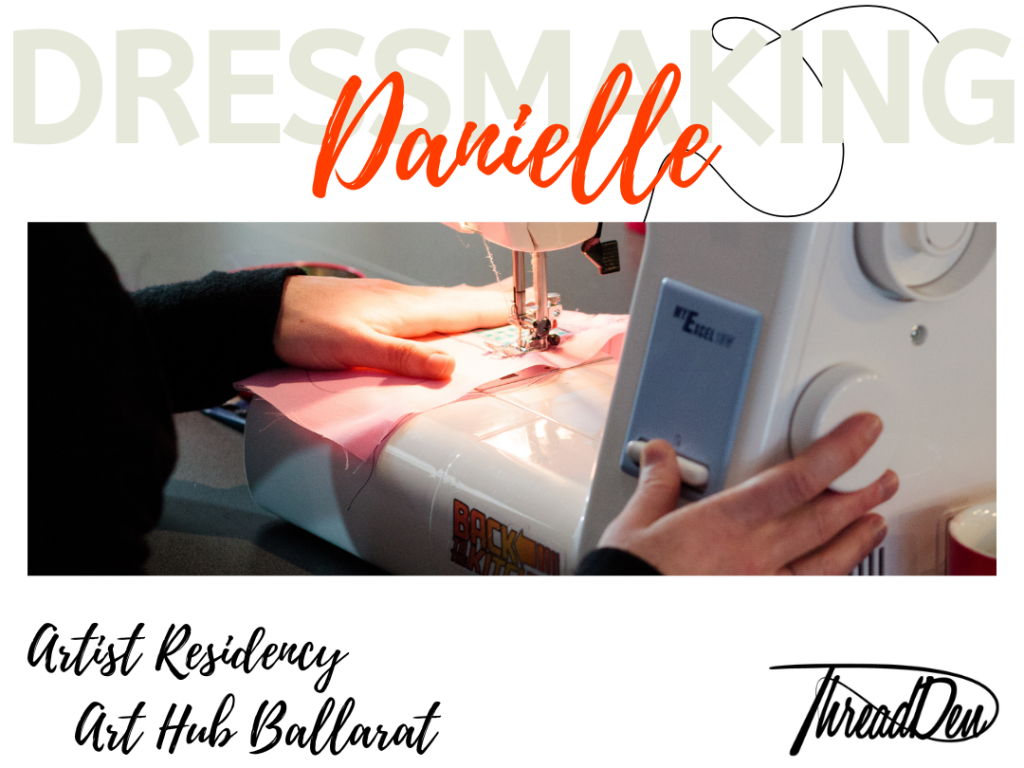Updated January 2026
Sewer Works Fabric Stores by Thread DenSewing Journal
Danielle – Art Hub Ballarat Residency

This year Danielle is undertaking a residency at Ballarat’s Art Hub for 3 months commencing in March 2026. “In my own dressmaking practice, I am very pragmatic; producing garments for a functional need. Through the time in the residency, I want to experiment and explore creativity in clothing that is not confined to functionality – to produce art for art’s sake.
Additionally, a variety of workshops will be run in the space for various skill levels to enable participants learn and get hands on. People interested in starting from the beginning or growing their skills can book in Private Lessons, come by the Gathering – Drop In sessions, or book into the Sunday Sewing School Workshops.
[Read more…] about Danielle – Art Hub Ballarat ResidencyPrevent your fabric from fraying
The edges of woven fabrics will fray unless they are finished or covered by a lining. Fraying is the ravelling of fabric edges that occurs. Some fabrics will fray more than others.
Some of the most common methods you can use to finish the edge of your fabrics to prevent this fraying include: trimming with pinking shears, overlocking, binding, constructing French seams and overcasting.
[Read more…] about Prevent your fabric from frayingWith or without nap?
Have you seen the note on the fabric requirements: *with nap or *without nap?
“Nap” means that the tiny fibres lie in one direction on the surface of a fabric.
[Read more…] about With or without nap?What is stay-stitching?
When you are following sewing patterns, you may come across the instruction to stay-stitch an edge (often a curved neckline is stay-stitched), but what on earth does that mean? We are here to help!
[Read more…] about What is stay-stitching?School holidays and after school sewing
Summer dreams ripped at the seams… But, oh! Those summer Nights!
We’re vibing Danny and Sandy as we plan Summer nights sewing up stylish fits!
Warm nights, creative vibes and the hum of sewing machines, Summer Saturday Nights at Thread Den are launching in 2026. We’re turning your summer Saturday evenings into stylish, skill-building adventures with two of our most popular garment workshops.
Across January, February and March, join us in Fitzroy for our Unisex Bomber Jacket Sewing Course, the incredibly flattering Zadie Jumpsuit by Paper Theory Sewing Course and the popular but challenging Fortnightly Coat Club. Whether you want to master structured outerwear or sew a modern, relaxed-fit jumpsuit, these evening sessions are the perfect way to unwind, create, and head home with a garment you’ll be proud to wear.
[Read more…] about Summer dreams ripped at the seams… But, oh! Those summer Nights!An op shop for fabrics!
Swim Style Patterns Courses
These courses feature sewing patterns by Swim Style Patterns based in New South Wales, Australia.
Sharon, owner and creator of Swim Style has been pattern making for 40 years. She has always shared the joys of sewing with her daughter, Justine. Now Swim Style is run by both Sharon and Justine, doing what the love the best – sewing!
Hooked on Yarn? Your New Favourite Corner of the Internet: Ravelry.com!
Many knitters, crocheters, spinners, weavers, and general yarn whisperers will have already discovered Ravelry.com, if not, you’re in for a treat! Ravelry is a free online community made just for people who love working with yarn. Whether you’re a seasoned shawl-maker or just learned how to chain stitch, there’s something here for you. It’s part inspiration board, part digital project tracker, and part bustling social club.
[Read more…] about Hooked on Yarn? Your New Favourite Corner of the Internet: Ravelry.com!Making a Winter Coat
Does the cold weather have you thinking about making a coat? We’ve had a look at popular coat patterns the sewing community loves to make.
[Read more…] about Making a Winter CoatDoes the cold weather have you thinking about making a coat? We’ve had a look at popular coat patterns the sewing community loves to make.
[Read more…] about Making a Winter Coat
